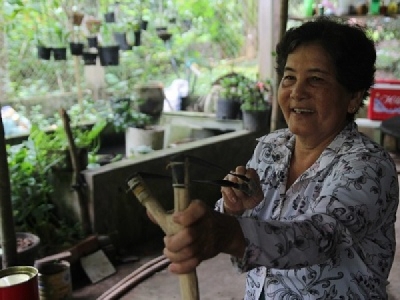
Posted on August 14, 2018
Three women are in the forefront as slingshot wielding teams patrol the Tien River and fight dangerous sand thieves.
On a summer afternoon on the Doi islet, a sand-theft prevention team starts the boat engine and heads for the Tien River from a small tributary.
Sitting on the boat prow, Ho Thi Be, 68, quickly scanned the river banks, a rubber catapult in her hands. Nearby lay a bunch of stones she’d collected. For the past year, Be and her team have cooperated with the police and captured 10 barges of illegally mined sand, each with of 50-100 cubic meters of the precious construction material.
“She is the oldest member of our team, also the most resilient. One time we were chasing a thief’s boat, she broke the boat light with a shot from her slingshot,” said Dao Thi Hong Thu, 54, another member of the team.
Just beside Thu are several sharpened bamboo sticks, ready for use in case of unwanted close encounters with the sand thieves.
In the Mekong Delta province of Ben Tre, illegal sand dredging has been disrupting the lives of locals for some time now.
With authorities apparently unable to take effective action against the thieves, the residents have decided to take matters into their own hands, braving violent attacks from the former as they patrol the river armed with the most rudimentary weapon – the slingshot.
In the sparsely-populated Doi islet, most men have gone away to make a living, so the team was very small when it was formed. Be asked her daughter, Tran Thi Tuyet Nhung, 36, to join her. After a year, the team now has 13 people, three of whom are female.
“When our team just formed, many people laughed at us and doubted our ability, for we were women. They only began trusting us after seeing us chase the thieves with sticks and slingshots,” Be said, smiling.
As night falls, the boat has traveled for three kilometers. Behind the wheel, team leader Nguyen Van Lai, 67, sends a light signal for the team. “It’s clear tonight. Let’s get back and save energy for the next patrol.”
Another day, another threat
At his age, Lai’s had the most encounters with sand thieves. One time, while chasing a sand dredger, he and his friends were flushed down the river by the thieves’ water cannons. If they were not exceptional swimmers, they might not have survived.
Another time, after exposing one group of sand thieves, Lai found a black plastic bag mysteriously left at his house. It contained dozens of rusty grenades. He rushed to give them to the police.
“There have been countless times when the sand thieves threw stones at us, bruising our heads. Our patrolling boat was stolen at night; other people also did not lend us their boats, fearing revenge,” recalled Lai.
But this adversity only strengthened the team’s resolve. They gathered their money and with a VND16 million ($688) donation, they bought two new two-ton boats.
Over the last year, the team has never missed an afternoon patrol on the river, come rain or shine. In the morning, Lai usually roams the area again on his motorbike.
“They (the thieves) usually come on weekends. If we miss a day, the whole year’s effort will go to waste,” said Lai.
On the banks of the Tien River, a house built a few years ago has been stripped bare, leaving just its pillars and metal frame. This was caused by land erosion three to four meters long.
Locals say severe landslides have been occurring for around seven years now, since the arrival of sand thieves. Each household has spent around VND50 million ($2,148) on stone embankments, but this has not been effective, as the illegal mining continues.
“More than 2,000 square meters of our garden soil fell down into the river. We had to tear down our house and build a new one 50 meters further inland, but there is no guarantee.
“The sand thieves have pushed us to a dead-end. Our land, our ancestor’s graves are all here, if we don’t fight back, we have no other place to go”, Thu said.
Remarkably effective
In just one year, the vigilantes have been remarkably effective, said Nguyen Thi Quynh Nga, Deputy Chairwoman of the Chau Thanh District People’s Committee.
“Since the establishment of the team, illegal sand dredging in the area has decreased significantly. We recently reviewed their activities and have proposed multiplication of the model.”
In Ben Tre Province, illegal sand dredging activities are vandalizing the lives of people on both banks of the river. The Mekong Delta province has licensed four sand mines in Chau Thanh, Cho Lach and Giong Trom districts, but in other places, illegal dredging continues apace.
According to some construction sand businessmen, a ton of cubic meter sand costs about VND80,000-100,000 ($3.43-4.29). Deducting the costs of fuel and labor, each barge of stolen sand may earn more than VND10 million ($429) profit per night.
Le Van Minh, Head of the Environmental Crime Prevention Division of the Ben Tre Police Department, said that so far this year, the province has detected more than 650 illegal sand mining vessels, double that of the same period last year.
They have imposed fines of nearly VND5.5 billion ($236,000), but this is unlikely to be an effective deterrent, making the work of the slingshot vigilantes even more crucial.
Source: VnExpress





